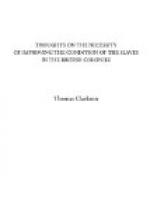if it be wrong, then I must contend that the Scriptures,
whose authority we venerate, are false. I must
contend that his slaves never could have been born
free agents and accountable creatures; or that, as
soon as they became slaves, they were absolved from
the condition of free-agency and that they lost their
responsibility as men. But if, on the other hand,
it be the revealed will of God, that all men, without
exception, must be left free to act, but accountable
to God for their actions;—I contend that
no man can be born, nay, further, that no man can be
made, held, or possessed, as a proper slave.
I contend that there can be, according to the Gospel-dispensation,
no such state as West Indian slavery.
But let us now suppose for a moment, that there might
be found an instance or two of slaves enlightened
by some pious Missionary, who would refuse to execute
their master’s orders on the principle that they
were wrong; even this would not alter our views of
the case. For would not this refusal be so unexampled,
so unlooked-for, so immediately destructive to all
authority and discipline, and so provocative of anger,
that it would be followed by
immediate and signal
punishment? Here then we should have a West
Indian master reversing all the laws and rules of
civilized nations, and turning upside down all the
morality of the Gospel by the novel practice of
punishing
men for their virtues. This new case affords
another argument, why a man cannot be born a proper
slave. In fact, the whole system of our planters
appears to me to be so directly in opposition to the
whole system of our religion, that I have no conception,
how a man can have been born a slave, such as the
West Indian is; nor indeed have I any conception, how
he can be, rightly, or justly, or properly, a West
Indian slave at all. There appears to me something
even impious in the thought; and I am convinced, that
many years will not pass, before the West Indian slavery
will fall, and that future ages will contemplate with
astonishment how the preceding could have tolerated
it.
It has now appeared, if I have reasoned conclusively,
that the West Indians have no title to their slaves
on the ground of purchase, nor on the plea of the
law of birth, nor on that of any natural right, nor
on that of reason or justice, and that Christianity
absolutely annihilates it. It remains only to
show, that they have no title to them on the ground
of original grants or permissions of Governments,
or of Acts of Parliament, or of Charters,
or of English law.
With respect to original grants or permissions of
Governments, the case is very clear. History
informs us, that neither the African slave trade nor
the West Indian slavery would have been allowed, had
it not been for the misrepresentations and
falsehoods of those, who were first concerned
in them. The Governments of those times were
made to believe, first, that the poor Africans embarked




